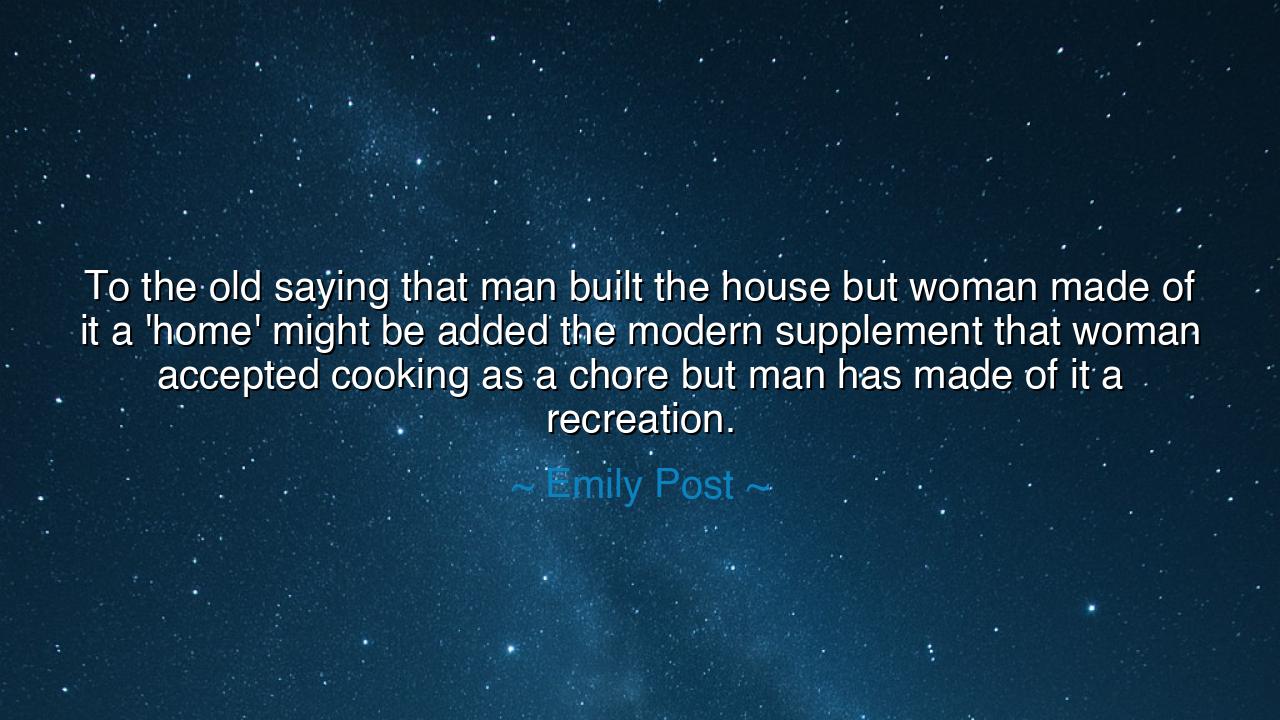
To the old saying that man built the house but woman made of it a
To the old saying that man built the house but woman made of it a 'home' might be added the modern supplement that woman accepted cooking as a chore but man has made of it a recreation.






In the ledgers of custom, an elder voice writes with a pointed quill: “To the old saying that man built the house but woman made of it a ‘home’ might be added the modern supplement that woman accepted cooking as a chore but man has made of it a recreation.” In these words, Emily Post weighs tradition like a magistrate and records a sly verdict on changing times. The proverb of old—man the builder, woman the maker—once sounded harmonious, but Post turns the crystal and shows a second facet: the unpaid, daily labor that women carried without applause becomes, in modern hands, a weekend hobby for men, praised and spotlighted. The sentence is half-tribute, half-gentle indictment.
To grasp the origin, remember Post as a cartographer of manners in the early twentieth century, charting the borders between private duty and public display. Her etiquette was never only about napkins; it was social arithmetic. She observed a culture where the house—mortgage, bricks, provision—could be counted, but the invisible labor that made it a home—care, meals, the thousand unseen stitches—was assumed. When men later entered the kitchen, they often did so on festival days or as connoisseurs, turning cooking into theatre—aprons as costumes, knives as wands—while women’s daily chore remained the quiet backbone of nourishment.
Behold the double weight of her sentence: it honors the art that makes shelter into sanctuary, yet it warns that the same work judged mundane in women’s hands becomes celebrated in men’s. The soup that must appear every night is duty; the risotto that appears once a month under candlelight is called genius. Thus the proverb is amended not merely to update it, but to expose the ledger’s imbalance. A culture may be refined in its sauces and still coarse in its gratitude.
Consider a tale from the kitchens of history. In grand hotels, Auguste Escoffier systematized cuisine, lifting the chef to near-royal stature. Meanwhile, in a hundred thousand flats, mothers and grandmothers turned leftovers into supper, timing the pot with the clock of children’s hunger. The one wore a tall toque and wrote menus in copperplate; the other wore an apron stained by love and necessity. Both made civilization edible. Yet which received medals, and which received only the expectation to “make do”? Post’s line invites us to honor both fires with equal warmth.
Or take a humbler scene: a family’s Sunday. The father “grills”—smoke, laughter, a photograph uploaded with hashtags. The mother, without fanfare, preps salads, sets the table, marinates yesterday, cleans tomorrow. When the plates arrive, compliments fly to the visible flame. The unseen labor remains air. Emily Post is not scolding delight; she is naming amnesia. If the home is a symphony, applause should meet every section, not only the trumpet’s solo.
Yet the sentence carries hope as well as rebuke. When men taste the joy of recreation in the kitchen, they can also learn its discipline; when women, long yoked to the chore, are seen and credited, joy can return to the task. The cure is not to banish hobbies but to balance honors; not to diminish festival cooking but to lift daily bread to the dignity it deserves. Etiquette at its best is love made practical—pronouncing thanks where silence once sat.
Therefore, let the lesson be inscribed for children yet unborn: a house is built with timbers, a home with attention. The hand that stirs on weeknights is as noble as the hand that flambés on weekends. Praise without parity curdles; gratitude evenly poured sweetens the whole table. If we would be refined, let us refine our thanks first.
Practical actions for a just and joyful table: (1) Share the cycle—plan, shop, cook, and clean on a rotating ledger so the chore becomes a covenant. (2) Credit precisely—when grace is said, name each laborer and task, from menu to mop. (3) Teach craft—let everyone, boys and girls, learn a weeknight meal and a feast-day dish, so cooking is both skill and celebration. (4) Budget time—respect the hours spent in the kitchen as real work, and free the worker afterward. (5) Keep a gratitude log on the fridge; let the ink remind the heart. In such ways, the proverb is redeemed: the home grows from shared work, shared joy, and honors that fit every hand.






AAdministratorAdministrator
Welcome, honored guests. Please leave a comment, we will respond soon